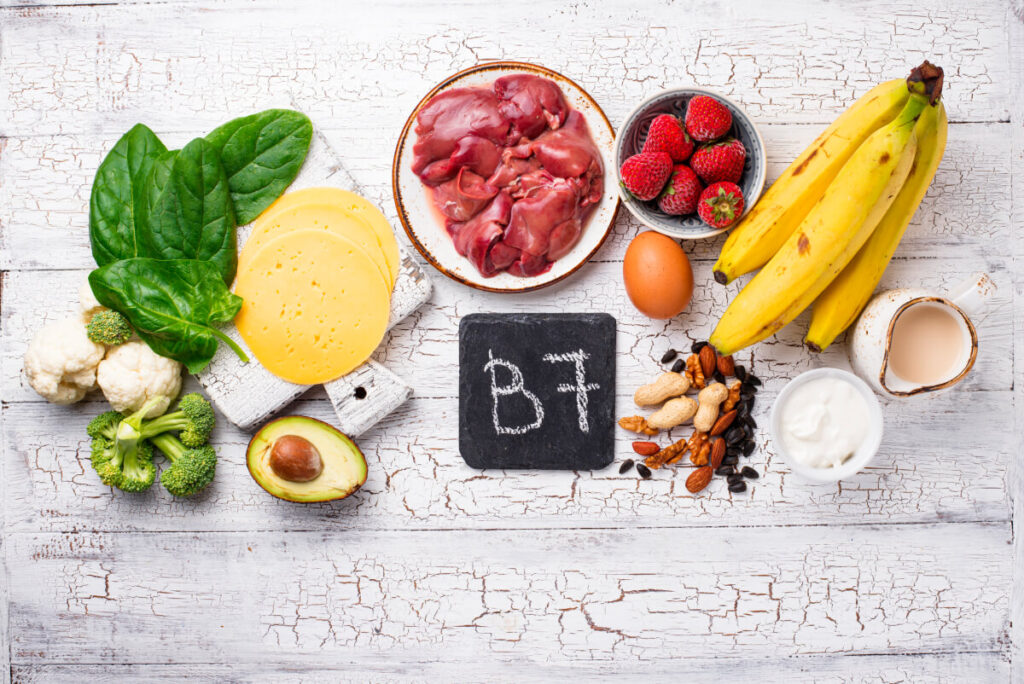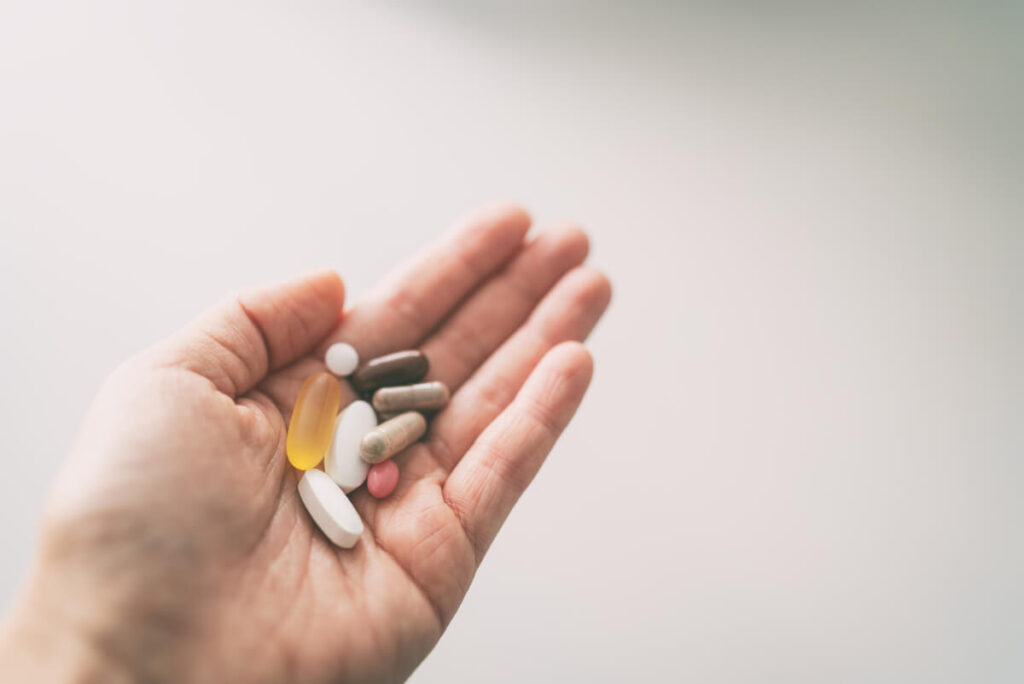Biotin supplements have become a popular beauty supplement for those looking to improve their hair growth. A balanced diet can provide you with all the biotin your body needs, but people with rare biotin deficiencies (and those that report positive effects from taking biotin supplements) can benefit from additional biotin supplements.
So exactly how much biotin supplements do you need for hair growth? Because the effects of biotin supplements for hair aren’t fully studied, it’s unknown how much you need before you start to see significant changes to your hair. But should you decide to take biotin supplements, here’s what you need to know.
How Much Biotin Do You Need?
Biotin (or vitamin B7) naturally occurs in many types of food, so having a balanced diet can provide you with enough biotin for your body. Because of relatively easy access to healthy foods, biotin deficiencies in the United States are rare. This is why the Food and Drug Administration doesn’t have an official recommended dietary allowance for biotin.
The Institute of Medicine, however, have suggested the daily adequate intake of biotin that a healthy diet should contain:
- For people 19 years and older: At least 30 micrograms
- 14 to 18 years old: At least 25 micrograms
- 9 to 13 years old: At least 20 micrograms
- 4 to 8 years old: At least 12 micrograms
- 1 to 3 years old: At least 8 micrograms
- Below 12 months: At least 6 micrograms
- Pregnant and breastfeeding women: At least 35 micrograms
The maximum daily intake is at 100 micrograms. If you want a more exact dose that’s right for you, consult your healthcare provider. They can check if you have a nutritional deficiency and can recommend if biotin supplements are safe for you. Symptoms of biotin deficiency include:
- Thinning hair which can progress into hair loss
- Brittle nails
- Dry skin
- Red skin rash on the face
- Conjunctivitis
- Insomnia
- Fatigue and nausea
- Loss of appetite
People taking biotin supplements can take around 2.5 to 5 milligrams per day. This can be beneficial for those with lower levels of biotin, and you’re likely to see the effects of taking these supplements within months – including hair growth. Those who don’t have biotin deficiencies are less likely to notice a difference, though some claim hair growth and healthy hair benefits after taking supplements.
The effects of long-term biotin consumption are unknown, so it’s recommended you don’t go beyond six months of taking a biotin supplement every day. Too much biotin can cause potential side effects like rashes, digestive problems, and issues with insulin release. The adverse effects of too much biotin are minimal, since excess amounts of the water-soluble B vitamin can pass through your body. However, some may experience nausea and digestive issues like bloating and stomach cramps.
Getting Biotin from Food

The biotin intake of an average person in the United States is around 35 to 70 micrograms of biotin in one day, which is within the healthy range of biotin levels recommended by the Institute of Medicine. Biotin is found in a variety of food, which is why biotin deficiencies are rare. As long as you have access to healthy food and have a balanced diet (and don’t have any medical conditions that affect biotin absorption), you most likely don’t have a biotin deficiency.
Biotin can be found in foods like:
- Egg – The egg yolk contains the most biotin. If eating a whole egg, make sure the egg whites are fully cooked. Raw egg whites contain avidin, which can affect your body’s absorption of biotin.
- Legumes – peanuts and soybeans are the highest sources of biotin, but peas, beans, and lentils also have a healthy serving of biotin.
- Organ meats – organ meats are rich in biotin, especially chicken and beef liver.
- Fruits like bananas, avocados, and strawberries
- Vegetables like sweet potatoes, broccoli, and spinach
- Meat and fish (chicken, salmon)
- Nutritional yeast
- Mushrooms
- Milk
Health Benefits of Biotin Supplements
Those who are biotin deficient can benefit from taking supplements to increase their biotin intake. In terms of hair health, those with biotin deficiencies may experience having hair loss or brittle hair; after taking biotin supplements, they report having healthier hair with an improvement on their hair growth and hair strength.
It’s not recommended you take biotin for hair growth if you don’t have a biotin deficiency. While there isn’t any scientific evidence that suggests biotin can improve hair, skin, and nails, evidence shows that a lack of biotin can cause damage to these areas.
If your body already has enough biotin, the cause for weak and sparse hair may have to be due to factors like other vitamin deficiencies, medical conditions that require treatment, or genetics, which can be difficult to treat with everyday supplements.
This means if you take biotin for hair loss without having a biotin deficiency, you’re unlikely to see a visible difference. Some users report an improvement in their hair quality, but it’s mostly limited evidence that doesn’t go for everyone.
Further research is needed to confirm biotin’s effects on hair growth, especially for those who don’t have biotin deficiencies. However, should you decide to take biotin or B-vitamin supplements, you can receive a number of other benefits that are proven.
For one, biotin is one of many B-vitamins that supports metabolism. This process takes glucose from carbs and converts it into energy and amino acids, which are essential in regular bodily function. Other benefits include:
- Improved cognitive function – biotin is one of many B-vitamins that have a direct impact on brain function. People that are deficient in B-vitamins can experience confusion, irritability, and depression.
- Lower blood sugar levels (for those with diabetes) – research suggests that people with type 2 diabetes can benefit from taking biotin supplements. Biotin can regulate the way your body produces insulin.
- Prevent kidney damage – people with insulin-dependent type 1 diabetes are prone to kidney damage. One study found that it could reduce oxidative damage.
- Regulate cholesterol levels – biotin can increase HDL (good cholesterol) and decrease LDL (bad cholesterol)
- Improve fetal development – a third of pregnant women are prone to biotin deficiencies due to their hormones. To provide enough biotin for the mother and the fetus, mothers must take prenatal vitamins that include biotin and folic acid to help with the pregnancy. Biotin is an important substance for embryonic growth.
Alternative Dietary Supplements for Hair Growth

Biotin supplements are best for those experiencing hair loss due to biotin deficiencies. While some with no deficiencies may report positive effects, the same may not happen for everyone. Consider other supplements, such as the following essential nutrients:
- Vitamin A – helps your body produce sebum, which can moisturize your scalp and hair. This prevents your hair from becoming dry and brittle. However, don’t take too much vitamin A as excessive amounts can also cause hair loss.
- Vitamin C – is an antioxidant that blocks free radicals from causing premature hair aging. It also helps with collagen production (which can help your hair structure) and helps with absorption of iron (which helps with hair growth).
- Vitamin E – also an antioxidant that can prevent oxidation and improve hair growth.
- Iron – helps produce red blood cells that can carry oxygen to other cells, including your hair. This can promote hair growth.
- Zinc – promotes hair tissue growth and repairs while keeping your oil glands and hair follicles working properly. Similar to vitamin A, too much zinc can also cause hair loss.
If you’ve tried other dietary supplements in the past, consider seeing a doctor for medical advice. Hair loss may be an underlying sign of another medical condition. You may have hereditary conditions that cause hair loss, or your doctor may recommend blood tests and laboratory tests can check for medical conditions. Dietary supplements can’t improve hair growth if you have these medical conditions.
Find The Perfect Beauty and Wellness Products for You at FACE Med Store
Biotin is an essential vitamin for bodily functions. However, biotin supplements for hair growth are only recommended for those with biotin deficiencies. If you’re experiencing hair loss or brittle hair but don’t have a biotin deficiency, you may want to consider other types of supplements or consult with a doctor to see if you have an underlying condition causing your hair damage.
For all your beauty and wellness supplies, FACE Med Store’s online shop has what you want and need. Get medical-grade supplies for your business or personal use. Our top-notch products are priced competitively for your savings and satisfaction. Visit FACE Med Store today.






